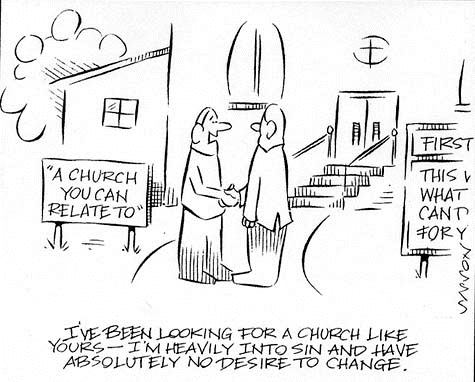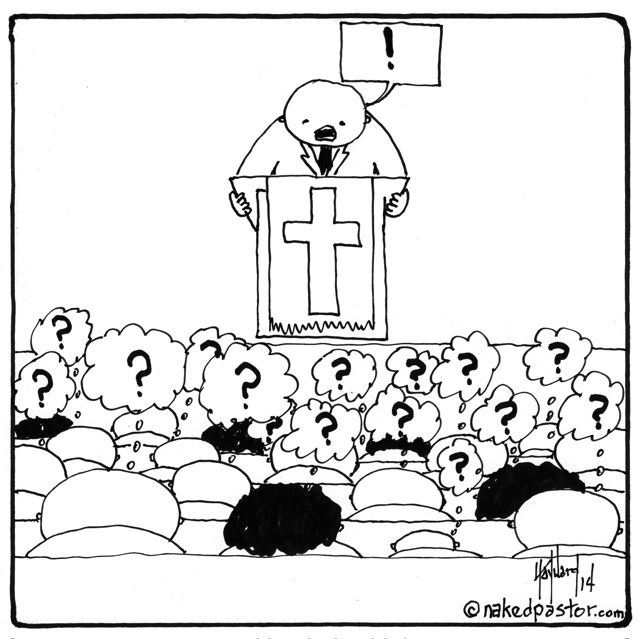
Allan Bevere shared the above image on Facebook. It certainly reflects a popular stereotype many conservatives have of liberal churches. But when one looks closely at such claims, a paradox emerges. Supposedly, liberal churches are pandering to the world for the sake of popularity. And yet liberal churches do not seem to be distinctively popular, and indeed, are often unpopular, both from the perspective of the non-Christian world, and from the perspective of the conservative churches.
One could make a case that that suggests that actual liberal churches are doing something right. Liberal churches may have different views about sin than conservative ones do. But typically they are not lacking in a stance on what can be called evil, nor happy to leave people unchanged. The sins liberals tend to focus on are injustice, bigotry, judgmentalism, and others – which a caricature of conservatives might suggest are equated with piety in conservative contexts. Indeed, one could redo the cartoon to make the point. The sign might say “Fundamentalist Christian Church,” and the visitor could say that this is just the church he has been looking for – one that will convince him that he has all the right answers, and that that justifies his smug arrogance.
But it is better to reach the point of leaving caricatures to one side, and asking instead about how liberal and indeed many other churches can move forward.
Many conservative churches do indeed specialize in offering answers. David Hayward’s cartoon which he shared today gets at this point:
There are so many ways that one can interpret it. One is as simply a description of an authoritarian fundamentalist church. Laypeople have questions. The pastor answers them. Problem solved.
But another possible interpretation is that the pastor is merely offering exclamation, not something that truly satisfies as an answer, despite his dogmatism. And the congregation remains with questions, which it cannot articulate out loud because of the culture of the church, in which having questions is sinful doubt.
I read somewhere recently that churches which demand commitment are growing or remaining stable, while others are declining. That doesn’t seem to me to fit my experience. It takes commitment be a church dedicated to social justice and equality, to allowing people to question, and to being a community that brings people of different backgrounds and perspectives together. It is a different sort of commitment, but it is something that I believe many people long for. The question is how to best offer it.
More and more Christians are finding that the assertions offered dogmatically by conservative pastors fail to satisfy, because they have the courage to examine them, and they are nowhere safe from voices offering different perspectives and pointing out problems. Samantha Field recently wrote:
My Harmonious Library understanding of the Bible– really, only a house of cards– has completely collapsed. It couldn’t bear up to an honest examination, and initially I thought I had to replace it with something else right away right now.
It took me a little while to realize that the only reason why I felt that way was that I was still stuck in the fundamentalist understanding of the Bible– as my only source of faith and practice. I simply couldn’t imagine being a Christian without a divinely-ordered Bible. Believing in the Bible as “inspired” was what made me a Christian, and this was as recently as last month. I think I’m starting to figure out that being a Christian has a lot more to do with my life and actions than it has to do with a book and what I believe about it.
The challenge for liberal churches – and better still, churches which are genuinely inclusive of liberals, conservatives, and everyone else – is to get our message out effectively, that we offer something challenging but worthwhile: a place where one can ask questions and discuss important topics without being ostracized, while working together to make a positive impact on the world around us in practical ways that we can collaborate on, across whatever differences doctrinal or otherwise we happen to have.













